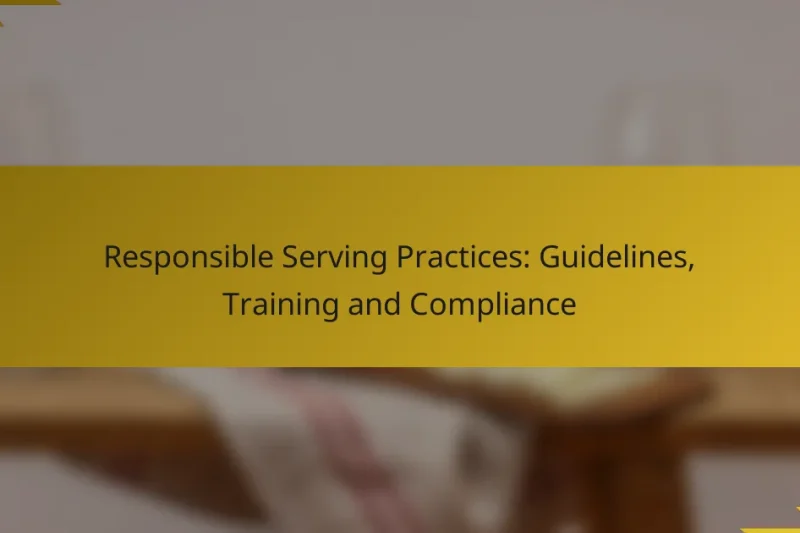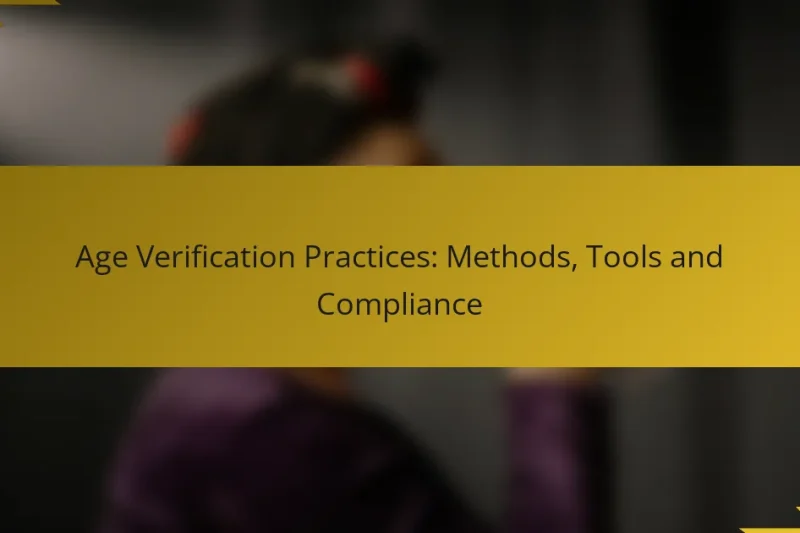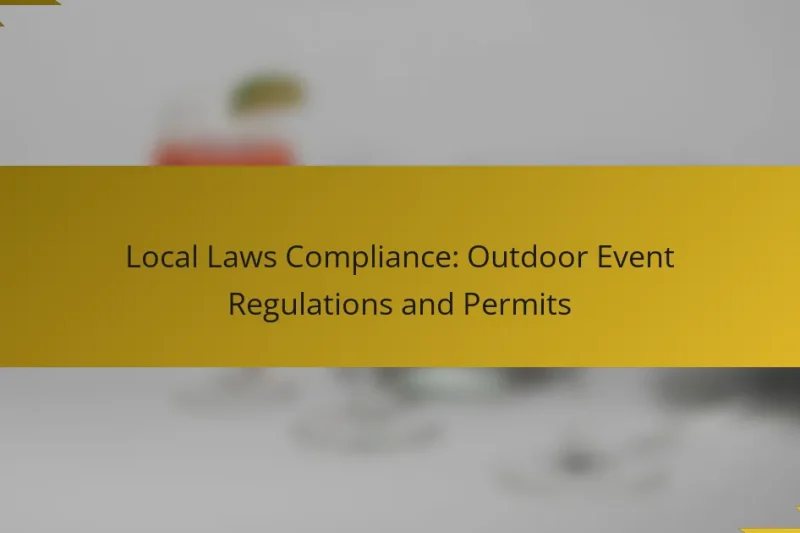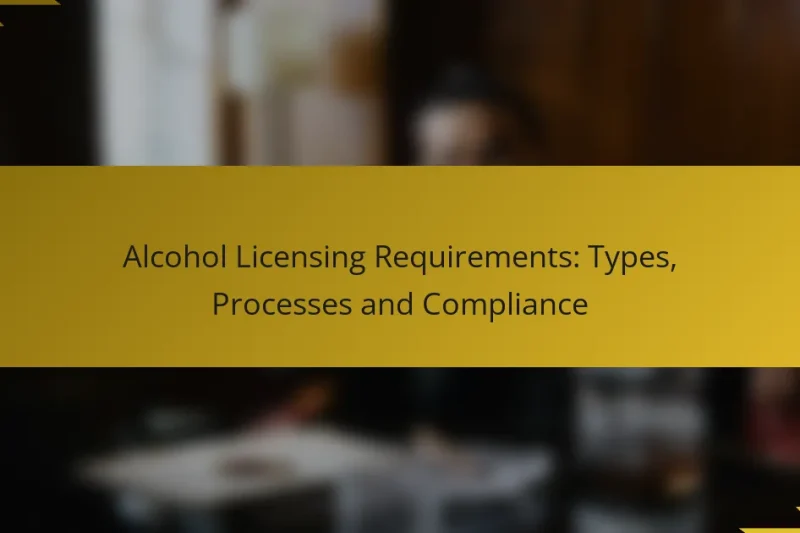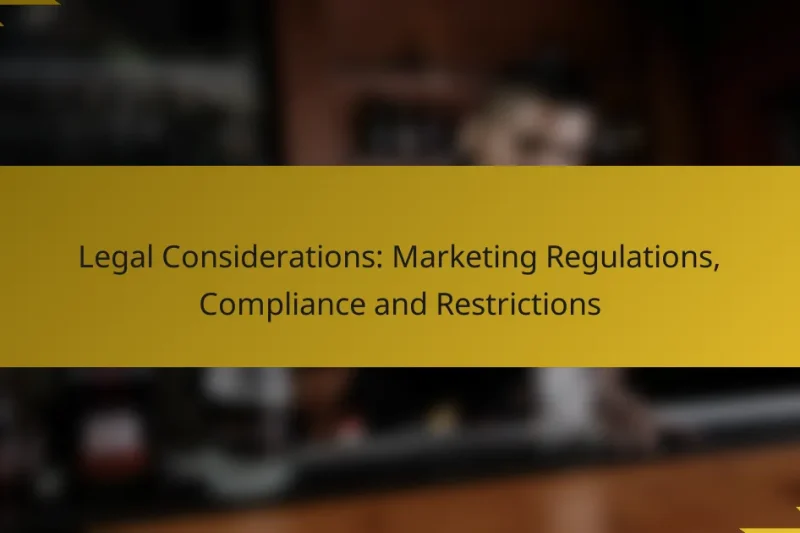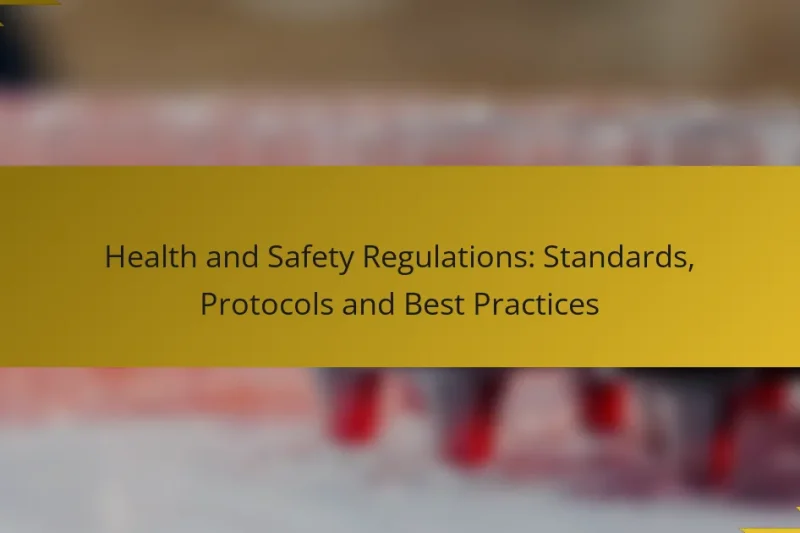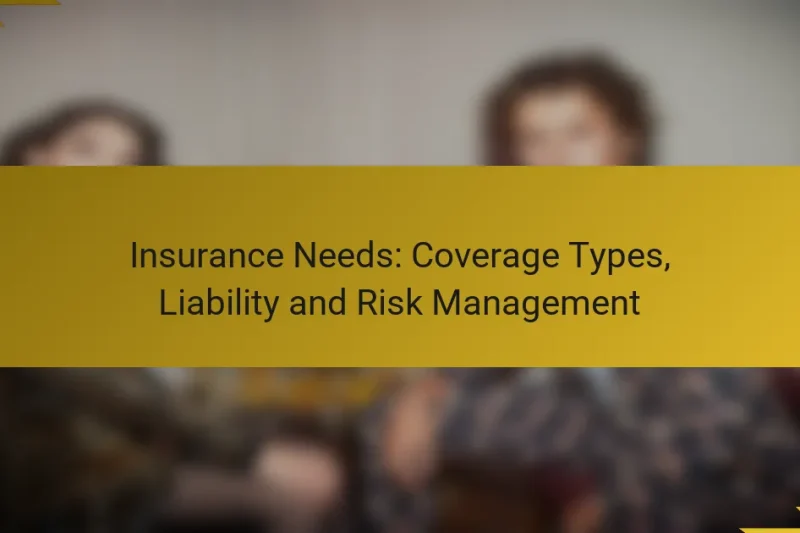Responsible serving practices are crucial for ensuring the safe and legal service of alcohol in various … Responsible Serving Practices: Guidelines, Training and ComplianceRead more
Legal Compliance in Events
Legal compliance is essential for the successful execution of events, encompassing various requirements such as permits, insurance, health and safety regulations, and data protection laws. By understanding and adhering to these regulations, event organizers can minimize legal risks and enhance their event’s overall success. Failure to comply can result in severe consequences, including legal penalties and reputational damage.
Age Verification Practices: Methods, Tools and Compliance
Age verification practices are essential for online platforms to ensure compliance with legal regulations while protecting … Age Verification Practices: Methods, Tools and ComplianceRead more
Local Laws Compliance: Outdoor Event Regulations and Permits
When planning outdoor events in Los Angeles, it is crucial to comply with local laws and … Local Laws Compliance: Outdoor Event Regulations and PermitsRead more
Alcohol Licensing Requirements: Types, Processes and Compliance
Alcohol licensing in the United States encompasses various categories, including retail, wholesale, manufacturing, and special event … Alcohol Licensing Requirements: Types, Processes and ComplianceRead more
Legal Considerations: Marketing Regulations, Compliance and Restrictions
Understanding the legal considerations surrounding marketing regulations is essential for businesses to operate ethically and effectively. … Legal Considerations: Marketing Regulations, Compliance and RestrictionsRead more
Health and Safety Regulations: Standards, Protocols and Best Practices
Health and safety regulations play a crucial role in safeguarding workers and the environment by establishing … Health and Safety Regulations: Standards, Protocols and Best PracticesRead more
Insurance Needs: Coverage Types, Liability and Risk Management
Understanding insurance needs is crucial for individuals and businesses to safeguard against financial risks. Essential coverage … Insurance Needs: Coverage Types, Liability and Risk ManagementRead more
What are the key legal compliance requirements for events in the United States?
Key legal compliance requirements for events in the United States include obtaining necessary permits and licenses, ensuring adequate insurance coverage, adhering to health and safety regulations, meeting accessibility standards, and complying with data protection laws. Each of these areas plays a crucial role in the successful and lawful execution of an event.
Permits and licenses
Obtaining the right permits and licenses is essential for hosting an event. Depending on the type and location of the event, you may need permits for public gatherings, alcohol sales, food service, and more. Check with local authorities to determine specific requirements, as they can vary widely by city and state.
Common permits include special event permits, noise permits, and health permits for food vendors. Start the application process early, as some permits can take weeks to approve.
Insurance requirements
Insurance is a critical aspect of event planning, protecting against potential liabilities. Most events require general liability insurance, which covers injuries and property damage. Depending on the event, you may also need additional coverage, such as liquor liability or cancellation insurance.
Consider the size and nature of your event when determining coverage amounts. Many venues will require proof of insurance before granting access, so ensure you have this in place well ahead of time.
Health and safety regulations
Health and safety regulations are vital for ensuring the well-being of attendees. This includes following guidelines for crowd management, emergency exits, and sanitation, especially if food is served. Familiarize yourself with local health codes and safety standards that apply to your specific event type.
Conduct a risk assessment to identify potential hazards and implement measures to mitigate them. This may involve hiring security personnel, providing first aid stations, or ensuring proper food handling practices.
Accessibility standards
Accessibility standards ensure that events are inclusive for all attendees. Under the Americans with Disabilities Act (ADA), venues must be accessible to individuals with disabilities. This includes providing wheelchair access, accessible restrooms, and appropriate seating arrangements.
Consider incorporating features such as sign language interpreters or assistive listening devices to enhance accessibility. Always consult with accessibility experts to ensure compliance and improve the experience for all participants.
Data protection laws
Data protection laws govern how personal information is collected, stored, and used during events. In the U.S., regulations like the California Consumer Privacy Act (CCPA) set standards for data privacy. If you collect attendee information, ensure you have a clear privacy policy in place.
Implement secure data handling practices, such as encryption and limited access, to protect personal information. Be transparent with attendees about how their data will be used and obtain consent when necessary.
How can event organizers ensure compliance with local laws?
Event organizers can ensure compliance with local laws by understanding applicable regulations, consulting experts, and implementing effective management practices. This proactive approach minimizes legal risks and enhances the overall success of the event.
Consult legal experts
Engaging legal experts is crucial for navigating the complexities of local laws related to events. These professionals can provide tailored advice on permits, liability issues, and compliance with health and safety regulations.
When selecting a legal expert, consider their experience with similar events and familiarity with local regulations. A good starting point is to seek referrals from industry peers or local event associations.
Conduct compliance audits
Regular compliance audits help identify potential legal risks and ensure adherence to regulations. Organizers should review contracts, permits, and safety protocols to confirm they meet local standards.
To conduct an effective audit, create a checklist that includes key compliance areas such as venue safety, vendor agreements, and insurance requirements. Aim to perform these audits well in advance of the event to allow time for necessary adjustments.
Utilize compliance management software
Compliance management software can streamline the process of tracking and managing legal obligations for events. These tools often include features for document management, deadline reminders, and reporting capabilities.
When choosing software, look for solutions that offer customization to fit the specific needs of your event. Many platforms provide user-friendly interfaces and can integrate with other event management tools, enhancing overall efficiency.
What are the consequences of non-compliance in event management?
Non-compliance in event management can lead to significant repercussions, including legal penalties, damage to reputation, and potential event cancellations. Understanding these consequences is crucial for ensuring that events run smoothly and within the bounds of the law.
Legal penalties and fines
Legal penalties for non-compliance can vary widely depending on the jurisdiction and the specific regulations violated. Fines can range from hundreds to thousands of dollars, and in severe cases, individuals or organizations may face criminal charges. It’s essential to stay informed about local laws, such as permits, safety regulations, and labor laws, to avoid these penalties.
For example, failing to obtain necessary permits for an event can result in fines that significantly impact the event budget. Regularly reviewing compliance requirements can help mitigate these risks.
Reputation damage
Non-compliance can severely damage an organization’s reputation, leading to a loss of trust among stakeholders, attendees, and sponsors. Negative publicity can arise from legal issues, which may deter future partnerships and attendance. Maintaining a strong compliance record is vital for building and preserving a positive public image.
For instance, an event that experiences safety violations may face backlash on social media, affecting future ticket sales and sponsorship opportunities. Proactively addressing compliance can enhance credibility and foster long-term relationships.
Event cancellations
In some cases, non-compliance can lead to event cancellations, either by regulatory authorities or due to internal decisions to mitigate risk. Cancellations can result in substantial financial losses, including lost ticket sales and vendor contracts. Understanding compliance requirements can help prevent such drastic outcomes.
For example, if an event does not meet health and safety standards, authorities may shut it down, leading to significant logistical challenges and financial repercussions. Ensuring compliance from the outset is crucial for the successful execution of any event.
What are the best practices for maintaining legal compliance in events?
Maintaining legal compliance in events involves adhering to relevant laws and regulations, which can vary by location and type of event. Key practices include regular staff training, creating compliance checklists, and staying informed about legal changes.
Regular training for staff
Regular training for staff is essential to ensure everyone understands their legal responsibilities during events. This training should cover topics such as health and safety regulations, data protection laws, and any specific industry standards relevant to the event.
Consider scheduling training sessions at least once a year, with refresher courses as needed. Engaging staff through interactive workshops can enhance retention and application of compliance knowledge.
Creating a compliance checklist
A compliance checklist serves as a practical tool to ensure all legal requirements are met before, during, and after an event. This checklist should include items such as permits, insurance, vendor contracts, and health and safety measures.
Develop the checklist based on the specific type of event and local regulations. Regularly review and update it to reflect any changes in laws or best practices, ensuring it remains relevant and effective.
Staying updated with legal changes
Staying updated with legal changes is crucial for maintaining compliance in events. Laws and regulations can evolve, impacting various aspects such as safety standards, accessibility requirements, and data privacy laws.
Subscribe to industry newsletters, attend relevant workshops, and consult legal experts to keep abreast of changes. Establishing a network with other event professionals can also provide valuable insights and updates on compliance matters.
What role does insurance play in event legal compliance?
Insurance is crucial for ensuring legal compliance in events by protecting organizers against potential liabilities and financial losses. It helps mitigate risks associated with accidents, property damage, and other unforeseen incidents that could lead to legal claims.
Types of insurance for events
There are several types of insurance that event organizers should consider. General liability insurance covers bodily injury and property damage claims, while event cancellation insurance protects against financial losses if the event is canceled due to unforeseen circumstances. Additionally, liquor liability insurance is essential if alcohol is served, as it covers claims related to alcohol-related incidents.
Determining coverage needs
Assessing the specific risks associated with your event is vital in determining the appropriate coverage. Factors to consider include the event size, location, activities involved, and whether alcohol will be served. For larger events, higher coverage limits may be necessary to adequately protect against potential claims.
Common pitfalls to avoid
One common pitfall is underestimating the necessary coverage, which can lead to significant financial exposure. Organizers should also avoid assuming that personal insurance policies will cover event-related liabilities. Consulting with an insurance professional can help ensure that all potential risks are addressed and adequately insured.
